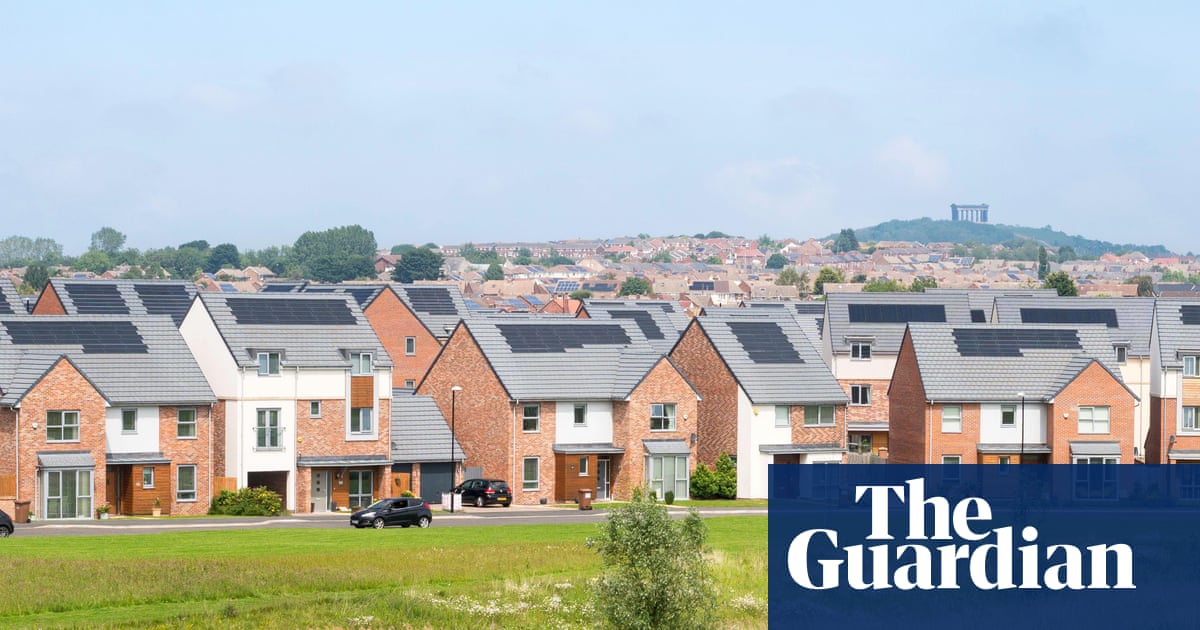English homes ‘face decades of high bills and emissions’ without urgent action from ministers
Ministers must take steps now to ensure that all homes are built to the most efficient low-carbon standards, or risk locking households into higher bills and greenhouse gas emissions for decades to come, a group of MPs and experts have urged.
The government is mulling changes to the building regulations in England to bring in a “future homes standard” that would require all new homes to be built with low-carbon equipment such as heat pumps and solar panels.
But key elements of the standard face stiff opposition from the housebuilding industry. The Guardian has learned that lobbyists from the industry are telling ministers that it will be impossible to meet the government’s flagship target of building 1.5m new homes in this parliament if they are required to meet stringent low-carbon standards.
Low-carbon building experts disagree. A recent study from the MCS Foundation found that equipping homes with heat pumps, solar panels and battery storage would save households living in a typical three-bedroom house more than £46,600 on energy bills over the course of a 25-year mortgage.
Experts have also said that installing such equipment is straightforward, and that the building industry could easily invest in the skills needed for its workforce. Retrofitting would cost up to five times as much, and the cost would fall on the householder rather than the builder.
As plans for the 1.5m new homes get under way, concerns over the future homes standard are mounting. It was consulted on under the Conservative government, which scrapped the previous draft version of the regulations, then known as the zero carbon homes standard, in 2015.
In a letter sent to the housing and planning minister, Matthew Pennycook, on Wednesday and seen by the Guardian, a group of MPs from all the main parties except Reform, low-carbon industry experts and civil society groups call on the government to hold fast to the necessary low-carbon standards and publish the new future homes standard without delay.
The signatories – 28 MPs, three peers and 12 industry bodies and civil society organisations – write: “The future of buildings standards in England could have a huge impact on household energy bills, UK carbon emissions and the domestic renewable energy sector. With the government promising to build 1.5m new homes by 2029, it is essential that these homes are built to standards that ensure low bills and minimal carbon emissions.
“We should not be building houses in the next five years that will have to be retrofitted, at much greater cost, five or 10 years later. The UK’s existing housing stock already contributes 17% of total carbon emissions, and new homes should help to reduce dependence on fossil fuels. Moving away from fossil fuels would also be a crucial step towards ensuring long-term energy security.”
David Cowdrey, the acting chief executive of the MCS Foundation, which coordinated the letter, said: “Mandating developers to put solar panels and heat pumps in all new build homes will not only save households thousands of pounds, it will also massively boost the domestic renewables workforce at no cost to the Treasury.”
Failing to make the regulations as stringent as possible would be a mistake, he said: “Years of delay and uncertainty has held back the shift to clean energy and heating. We should not be building homes next year and the year after that will have to be retrofitted in ten years’ time, and so the government must now introduce the long-awaited future homes standard, with a mandate for renewable technology, without delay.”
The Liberal Democrat MP for Cheltenham, Max Wilkinson, is also bringing forward a private members’ bill that would require the installation of solar photovoltaic generation equipment on new homes and set minimum standards so developers are not able to skimp on panels.
Wilkinson said: This “‘sunshine bill’ is a vital step in creating a brighter future, tackling the climate crisis while also saving British households money on their bills. It is madness that new homes are being built without solar panels, when we know solar helps to bring down energy costs and reduce emissions. It’s a win-win.”
A spokesperson for the ministry for housing, communities and local government said: “We want to ensure new homes and buildings are sustainable and fit for the future. That is why we consulted on a future homes standard designed to deliver net-zero ready homes, with low carbon emissions. We will respond to the consultation in due course.”




Post Comment